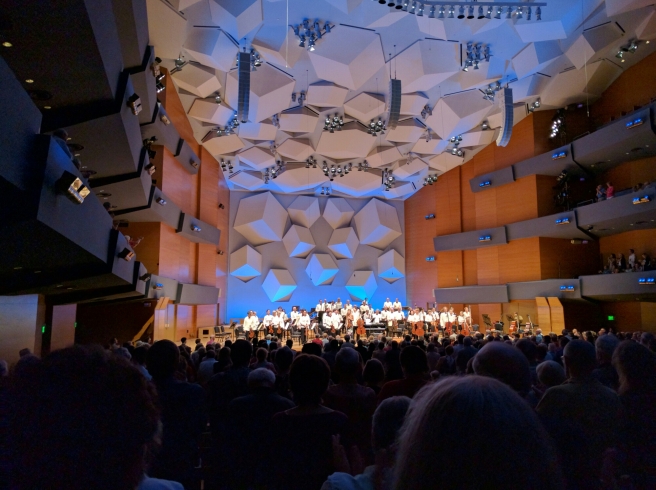Saturday, July 16 2016
Orchestra Hall, Minneapolis, MN
Minnesota Orchestra
Andrew Litton, conductor and piano
Nicola Benedetti, violin
Leonard Elschenbroich, cello
Beethoven, Overture to Fidelio (1814)
Beethoven, Concerto for Piano, Violin, Cello and Orchestra “Triple Concerto” (1803)
Brahms, Symphony No. 4 (1885)
Wrapping up a highly satisfying weekend in Minneapolis, I caught a Sommerfest concert highlighted by Beethoven’s rarely heard Triple Concerto. Rarely heard, I suppose because the number of soloists involved makes it difficult to pull together a polished performance with limited practice time, which is what these summer concert series are for–audience seems to not demand as much perfection when the weather is nice. Rising stars Nicola Benedetti and Leonard Elschenbroich joined conductor Andrew Litton, who double dutied at the piano, for an admirable attempt at the Triple Concerto. Prior to Ms. Benedetti and Mr. Elschenbroich taking the stage, Mr. Litton felt compelled to inform us that the two of them are an item, which seemed like unnecessary information at the time but in retrospect may have been to adjust the audience’s Bayesian prior toward the belief that the two of them play as one. Spoiler alert, they did not.
The whole thing was a mess, really. By now I expect to cringe at any American orchestra’s wind sections, but Minnesota Orchestra’s (what I presume to be second tier) winds were a notch below that already low bar. Between that and the poor acoustics of the concert hall, a muffled echo trapped the sounds of the soloists throughout the first movement. Seemingly desperate to break free, Ms. Benedetti played with much less restraint after the opening movement, and poor Mr. Elschenbroich couldn’t keep up, which led to a labored negotiation between their instruments on tempo that was never quite settled. (Mr. Litton had his hands full with the piano and was of little help at arbitrating.) Nevertheless, the audience seemed to appreciate the effort and leapt to its feet with a prolonged standing ovation.
The Brahms symphony in the second half of the concert went much better. Brahms symphonies are usually good for hiding lack of finesse, and besides I’m certain the orchestra has played Brahms’s 4th countless times in the recent past that little rehearsal time was needed. Even so, many of the wind solos barely eked out the right notes and made no pretense at any kind of interpretation. Against this underwhelming backdrop, I led my mind wander and became distracted by the awful florescent blue lighting and the weird 3-dimensional geometric cutouts protruding from the concert hall’s walls; it’s as if someone accepted the challenge to construct a more trippy version of David Geffen Hall. At the end, however, Brahms rarely disappoints and the sweeping majesty of the music carried the orchestra to a serviceable, if not rousing, finish.
As for the opening overture, there isn’t much to say except that Beethoven and opera are an odd match. Still, Beethoven’s got a high batting average, unlike, say, a certain Cleveland catcher that I saw at Target Field on Friday. Trust me, that will be the best link you click on all week.

